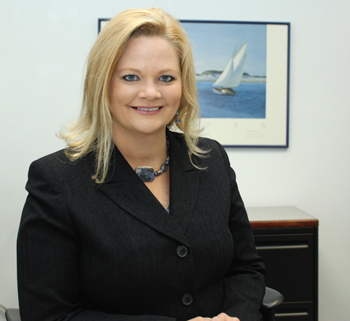Leaving AVMA to lead examination board
Dr. Heather Case has helped young veterinarians develop as leaders, cared for animals displaced by disasters, and worked to give veterinarians a voice in federal government.
After nearly seven years in the AVMA Scientific Activities Division, about five of them as director, she left the AVMA in late June to become executive director of the National Board of Veterinary Medical Examiners on Aug. 1. She succeeded Dr. John R. Boyce, who had led the organization for the nearly 20 years it has been independent of the AVMA.

Dr. Gary Gackstetter, NBVME board chair, expressed gratitude to Dr. Boyce for his dedicated service, then said, “Dr. Case brings a wealth of experience, enthusiasm, and demonstrated leadership to the NBVME and is precisely what the organization needs as we look to the future and new enhancements to the current North American Veterinary Licensing Examination.”
The NBVME develops the NAVLE and other examinations used by licensing boards and veterinary colleges.
Transition to education role
Dr. Case said she takes the new job at a time when veterinarians are increasingly examining their profession’s trajectory, and licensure is important in that regard. Leading the organization provides an opportunity to have a positive influence on veterinary medicine’s future.
She noted that the NBVME’s work fits with her longtime interests in veterinary medical education and in regulatory veterinary medicine.
“NBVME is protecting the public with their test,” Dr. Case said. “I find that very valuable.”
She received her DVM degree in 1998 from the University of Minnesota and her Master of Public Health there in 2006. She is a diplomate of the American College of Veterinary Preventive Medicine.
Dr. Boyce said he expects that Dr. Case’s experience in public health will be an asset that fits with the organization’s mission. He also said he would provide support as requested during the transition between administrators.
Before the NBVME became a separate institution, Dr. Boyce was AVMA assistant director of scientific activities–education and served as staff consultant to the NBVME, then called the National Board Examination Committee.
Volunteer, then staff member
Dr. Case said the Scientific Activities Division’s veterinarians have been the voice for “boots-on-the-ground veterinarians” to communicate with Congress and federal regulators.
In June she said, “Any of those issues that might impact the veterinarian, we’re watching very closely the federal agencies in D.C., and law coming through Congress, to make sure that we’re providing scientific technical expertise to the Governmental Relations Division, to any of the other policy divisions, to make sure that everyone’s understanding what the impact might be for a veterinarian in the field.”
Dr. Case was a volunteer for the AVMA prior to being hired by the Association in August 2007. She spent two months in Louisiana in response to Hurricane Katrina in 2005, working with an AVMA Veterinary Medical Assistance Team. That included work as commander of shelter medicine and logistics work to support search-and-rescue dogs. The federal government has since developed its own National Veterinary Response Teams. Dr. Case, then an AVMA staff member, oversaw changes in the VMAT as it shifted focus toward helping states respond to disasters and improving animal-related disaster training.
Before joining the AVMA staff, she was also an AVMA Congressional Science Fellow, and she chaired the AVMA Veterinary Leadership Conference Planning Committee through her first year on staff.
Dr. Case counts development of the AVMA Future Leaders Program among her top accomplishments with the Association. She was part of the staff team that developed the pilot program, and the now-permanent program’s third class was scheduled to end its term in late July at the AVMA Annual Convention.
The program helps ambitious young veterinarians become involved in veterinary association governance. Past participants have become presidents of state VMAs, participated in competitive fellowships, and started working with federal agencies. A member of the first class, Dr. Erin Casey, is the chair of the AVMA Veterinary Leadership Conference Planning Committee.
Dr. Case said she has enjoyed her time with the AVMA and appreciated the opportunity to work with the AVMA.
“It’s exciting to me that there’s another opportunity where I can still work on behalf of the profession in a very meaningful arena,” she said. “And I just think that’s a unique part of our degree.”
Dr. Ron DeHaven, AVMA CEO, praised Dr. Case for stellar work in directing the Scientific Activities Division and said he is proud of her accomplishments at the AVMA. “It was truly a pleasure to work with Heather at AVMA, and I look forward to collaborating with her in her new capacity at NBVME.”
Related JAVMA content:
National licensing board CEO on his way out (Feb. 1, 2014)